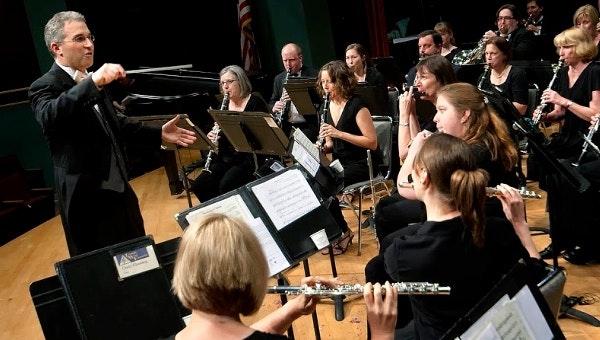
Learn and practice the basic principles of running an effective music ensemble rehearsal. Techniques and strategies are applicable to a variety of ensembles, including bands, orchestras, choirs, and chamber groups.
What's inside
Syllabus
An Introduction to Rehearsing
This week, Module 1, we’ll discuss basic philosophical issues such as: What we do in rehearsals, what skills are needed, and the idea of the conductor as “the composer’s advocate.” I will also introduce the concept of Macro-Micro-Macro, which serves as the overarching principle of rehearsals. Then we will move on to basic conducting technique.
Read more
Syllabus
Good to know
Save this course
Reviews summary
Course for running music groups
Activities
Review basic music theory concepts
Show steps
Reviewing basic music theory concepts such as scales, intervals, and chords will help strengthen your understanding of the material covered in this course.
Browse courses on
Music Theory
Show steps
-
Review a music theory textbook or online resource
-
Complete practice exercises to test your understanding
Watch video tutorials on conducting techniques
Show steps
Watching video tutorials on conducting techniques will help you visualize and learn the proper techniques for conducting an ensemble.
Show steps
-
Find video tutorials on conducting techniques
-
Watch the tutorials and take notes
Read 'The Score: Music, the Brain, and the World We Make'
Show steps
Reading 'The Score' will provide you with a deeper understanding of the science of music and how it affects the brain.
View
This Is Your Brain on Music
on Amazon
Show steps
-
Read the book
-
Take notes on key concepts
Two other activities
Expand to see all activities and additional details
Show all five activities
Create a practice plan for an upcoming rehearsal
Show steps
Creating a practice plan for an upcoming rehearsal will help you organize your thoughts and prepare for the rehearsal in a structured way.
Show steps
-
Identify the goals of the rehearsal
-
Plan the order of activities
-
Prepare materials and resources
Start a project to conduct a small ensemble
Show steps
Starting a project to conduct a small ensemble will give you hands-on experience in conducting and allow you to apply the concepts you learn in the course.
Show steps
-
Find a group of musicians to form an ensemble
-
Select a piece of music to rehearse and perform
-
Rehearse the piece regularly
-
Perform the piece for an audience
Review basic music theory concepts
Show steps
Reviewing basic music theory concepts such as scales, intervals, and chords will help strengthen your understanding of the material covered in this course.
Browse courses on
Music Theory
Show steps
- Review a music theory textbook or online resource
- Complete practice exercises to test your understanding
Watch video tutorials on conducting techniques
Show steps
Watching video tutorials on conducting techniques will help you visualize and learn the proper techniques for conducting an ensemble.
Show steps
- Find video tutorials on conducting techniques
- Watch the tutorials and take notes
Read 'The Score: Music, the Brain, and the World We Make'
Show steps
Reading 'The Score' will provide you with a deeper understanding of the science of music and how it affects the brain.
View
This Is Your Brain on Music
on Amazon
Show steps
- Read the book
- Take notes on key concepts
Create a practice plan for an upcoming rehearsal
Show steps
Creating a practice plan for an upcoming rehearsal will help you organize your thoughts and prepare for the rehearsal in a structured way.
Show steps
- Identify the goals of the rehearsal
- Plan the order of activities
- Prepare materials and resources
Start a project to conduct a small ensemble
Show steps
Starting a project to conduct a small ensemble will give you hands-on experience in conducting and allow you to apply the concepts you learn in the course.
Show steps
- Find a group of musicians to form an ensemble
- Select a piece of music to rehearse and perform
- Rehearse the piece regularly
- Perform the piece for an audience
Career center
Music Instructor
Music Director
Choir Director
Orchestra Conductor
Band Director
Music Teacher
Musician
Music Therapist
Arts Administrator
Music Journalist
Music Critic
Music Engineer
Music Producer
Music Promoter
Music Librarian
Reading list
Share
Similar courses
OpenCourser helps millions of learners each year. People visit us to learn workspace skills, ace their exams, and nurture their curiosity.
Our extensive catalog contains over 50,000 courses and twice as many books. Browse by search, by topic, or even by career interests. We'll match you to the right resources quickly.
Find this site helpful? Tell a friend about us.
We're supported by our community of learners. When you purchase or subscribe to courses and programs or purchase books, we may earn a commission from our partners.
Your purchases help us maintain our catalog and keep our servers humming without ads.
Thank you for supporting OpenCourser.



